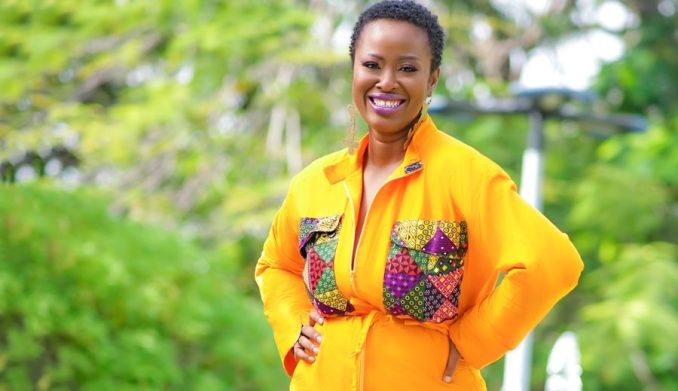
Sierra Leone Telegraph: 15 January 2021:
Adama Loves Akara is a new children’s book from Sierra Leonean TV host Vickie Remoe that encourages early reading, family time, and multiculturalism. Illustrated by Luseni Kallon, the book was inspired by Remoe’s son, who exclaimed at age three that his early reader Bob Books “did not make sense”.
Remoe said that the books she was using to teach her son Olu, though useful for phonics, did not represent African culture. She set out to write a series that would teach early literacy skills and focus on her culture.
“I bought my son’s first reader the same day I bought his first pampers. It wasn’t until we started to actively focus on developing his phoneme awareness that I noticed the absence of African culture in the early readers,” said Vickie Remoe, author of Adama Loves Akara.
 “Everything from the characters’ names to the books’ activities focuses on American and British culture. Even as they’re learning English, they must see themselves in the content they read right from the start.”
“Everything from the characters’ names to the books’ activities focuses on American and British culture. Even as they’re learning English, they must see themselves in the content they read right from the start.”
Adama Loves Akara is about a Sierra Leonean daughter and father duo who enjoy reading, playing learning games, and sharing their favourite snack – akara. The book introduces early readers to short and long ‘a’ vowel sounds.
The 24-page book is an easy, enjoyable read with illustrations that showcase Sierra Leone’s gara tie-dye textiles, food, and the special bond between fathers and daughters. The book also includes a map of Sierra Leone and a recipe for Akara.
Akara is a deep-fried banana and rice flour fritter from Sierra Leone. In Ghana, akara is bofrot, and in Nigeria, puff-puff. Unlike the Sierra Leonean akara both the Nigerian and Ghanaian recipes are without banana.
The Paperback version of Adama Loves Akara for children aged 0-6 is currently available on Amazon for families and pre-schools worldwide.


Congratulations to Ms Remoe for her publication of this children’s book – Adama Loves Akara. Yes sometimes as authors of books, generations after generations like to point out what inspired them to write. In vast majority of cases they will say their light bulb moment came when they visit a library, or a bookshop and their children towing after them looking for a book, and realised there is not a lot of books on the shelf published by authors that look like them. This is especially so for African children in the continent, or African families in the diaspora. There is not enough of our cultural heritage written for our children. It matters because as children, what you read at that age, stays with you for the rest of your life.
Its your window to the world with its diverse cultures and heritage. So for young children it is easy to be snapped up by other people’s cultures by just reading their books that says their history and culture are better than yours. And this has been the case for Africans. In those early years, it helps you shape your thinking. This is true when you look at children’s books published in the West years gone by that always illustrated black characters as bad, and white characters as good. So if you imagine your 4 or 5 year old as a black child sitting there and reading that stuff, the damage it does to you. I wish Ms Remoe all the best.
Adama loves Akara? Well, we all love Akara, everyone, rich people and poor grew up stuffing ourselves with the different delicious varieties of Akara that can be found in diverse countries throughout the African continent.(lol)In places like Nigeria and Ghana Akara is made exclusively from beans and I have been told that when it was created a very long time ago by the Yoruba and Hausa people, there was a fist fight that ensued in a dispute between the two tribes over who was the rightful over of the extraordinary recipe.(lol) In our Sierra Leone, the Akara I remember eating was made with a mixture of bananas that was blended with flour and sugar – In the Ivory Coast it is prepared in the same way. Indeed, ‘Adama loves Akara’ is a great title for a book that would easily grab the attention of children and parents alike, and I have a hunch that the writer has made it quite enjoyable for even the tiniest itsy-bitsy children to be able to read and understand its contents with great ease.
Again as an ardent believer in Pan-African ideas, I have always maintained that there will be no saviours for Africa but ourselves, and that is the principal reason why it is imperative that we empower even those we consider to be the least educated and poorest of the poor among us. Empowerment that would prove beneficial to our people must be deeply entrenched in African culture, beliefs and ideas, and that must begin with a purposeful intention to shape and mould the hearts and minds of our children at a very early age like the writer is currently striving to do with her children’s book.
It all starts at young age; Hey! If you do not want your children to become carbon copies of Americans and Europeans in such a frightening way that will cause you to shed copious tears, then do the right thing and start teaching them what you would like them to know NOW – for the wisest man that has ever lived, King Solomon once gave us this stern, intuitive warning a long time ago;” Train up a child in the way he should go, so that when he is old he will not depart from it.” (Proverbs 22:6)Bravo lady, for your decisive effort to make a positive influence in the lives of our little ones.